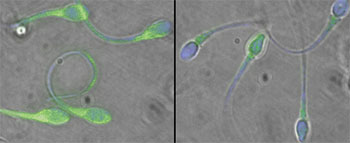 The Cherr Lab has been working on defensins in reproductive biology. Defensins (including ß-defensins) are part of the innate immune system that is understood to be the key defense against disease in invertebrates; homologous peptides exist in invertebrates as “antimicrobial peptides”. In the Cherr lab collaboration over the past 9 years with Professor Charles Bevins (an internationally recognized expert on defensins) at the UC Davis Medical School as well as others, they have discovered a polymorphism in the DEFB126 gene, a dinucleotide deletion in the coding region of the DEFB126 mRNA that results in a null mutation. A beta-defensin (DEFB126) comprises the sperm glycocalyx, and provides a “cloaking device” for sperm so they are not detected in the female tract. This glycocalyx must be “peeled” away from sperm as they capacitate just prior to interaction with the oocyte. Interestingly, once DEFB126 comes off of sperm, it can be added back to sperm and it reattaches and returns sperm to a functional state they were in prior to its release. In 2011, we published a groundbreaking study on the consequences and high frequency in men worldwide (~25%) of this non-stop deletion mutation in the human gene encoding DEFB126 in Science Translational Medicine, which was listed in the Top 100 Scientific Discoveries of 2011 of Discover magazine.
The Cherr Lab has been working on defensins in reproductive biology. Defensins (including ß-defensins) are part of the innate immune system that is understood to be the key defense against disease in invertebrates; homologous peptides exist in invertebrates as “antimicrobial peptides”. In the Cherr lab collaboration over the past 9 years with Professor Charles Bevins (an internationally recognized expert on defensins) at the UC Davis Medical School as well as others, they have discovered a polymorphism in the DEFB126 gene, a dinucleotide deletion in the coding region of the DEFB126 mRNA that results in a null mutation. A beta-defensin (DEFB126) comprises the sperm glycocalyx, and provides a “cloaking device” for sperm so they are not detected in the female tract. This glycocalyx must be “peeled” away from sperm as they capacitate just prior to interaction with the oocyte. Interestingly, once DEFB126 comes off of sperm, it can be added back to sperm and it reattaches and returns sperm to a functional state they were in prior to its release. In 2011, we published a groundbreaking study on the consequences and high frequency in men worldwide (~25%) of this non-stop deletion mutation in the human gene encoding DEFB126 in Science Translational Medicine, which was listed in the Top 100 Scientific Discoveries of 2011 of Discover magazine.
